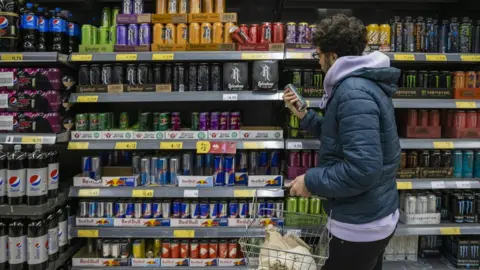Obesity in Wales: Energy drinks ban for children proposed
 Getty Images
Getty ImagesSelling energy drinks to under-16s could be banned in Wales in a bid to tackle childhood obesity.
More than one in four children are overweight when they start primary school, according to official figures.
Under Welsh government proposals, takeaways could also be stopped from opening near schools and free soft drink refills could be banned.
The consultations are aimed at informing new legislation to try to improve the health of young people.
The UK government launched a consultation on plans to ban the sale of energy drinks in England to anybody under 18 in 2018, but a law has not been passed.
Currently, identification is not legally required but some supermarkets already stop under-16s from buying soft drinks with high-caffeine content - mostly those with more than 150mg of per litre, which carry a warning stating they are not recommended for children.
"We're looking at things like price promotions where unhealthy food is cited in supermarkets, having calorie labelling in takeaways and restaurants, so it's a whole range of measures that we're consulting on," said deputy minister for mental health, Lynne Neagle.
Ms Neagle met pupils at Whitchurch High School in Cardiff where nutritional values form part of lessons about food.
"They were brilliant and really well-informed and thought that education was really important and that there were other things as well that we could do such as making the labelling warning of the dangers for young people more prominent," she said.


What do teenagers think of the ban?
Year 9 pupil Lewis agreed with some of the proposals but called banning the sale of energy drinks "a bit extreme".
"I think it's more general stuff that would work like not putting them near the checkouts and maybe shops should put fruit at the tills," he said.
"It's just that when you see chocolate there, it's more likely you'll go for the chocolate, but people still like fruit as well."

Classmate Callum, said schools should do more to teach pupils about foods that are high in sugar and fat.
"Banning energy drinks will just mean under-16s will just ask someone over 16 to get them for them," he said.

"I think you need to educate people on energy drinks because some people just drink energy drinks every day of the week like it's water," said Kundi.
"So we need to educate them in school and cooking lessons but we shouldn't ban them because they do taste nice and yes, they are unhealthy, but it's about educating young kids on how unhealthy they are."

Deeptha said: "I don't think a ban's a good idea because taking them away won't solve the problem.
"Instead advising them and educating them more would be a better option.
"I hope the deputy minister does take our views on board because we the people vote for them and that's really important if we want our country to improve."

In Wales, approximately 1.5 million adults are overweight and 600,000 people are obese - a Body Mass Index (BMI) of 30 to 39.9.
However, this is not the case for everyone and BMI is not used to diagnose obesity as very muscular people will have a high BMI but not much body fat.
Obesity is linked to premature deaths from cancer, heart disease, liver disease and type 2 diabetes.
The latest National Diet and Nutrition Survey shows people are consuming too much sugar, saturated fat, salt and calories, but not enough fibre, fruit and vegetables.
The survey showed that people aged 11 -18 consumed up to three times the recommended maximum amount of sugar.
Some energy drinks have 21 teaspoons of sugar and the same caffeine as three cups of coffee.
Research shows that children who drink at least one energy drink per week are more likely to report symptoms such as headaches, sleep and stomach problems, as well as low mood and irritability.
Research by the charity Nesta Cymru found that Welsh consumers significantly underestimated the number of calories in popular snacks.
In the poll, 95% of Welsh respondents underestimated the calories in half a sharing bag of crisps containing 447 calories, the average guess was less than half the correct answer.
While most people were broadly accurate at guessing the calorie content of meals and drinks, they significantly underestimated the calories of crisps, chocolates and sausage rolls.
Half of the respondents overestimated the calories in a Big Mac with medium fries, with an average guess of 1,050 calories compared to the true value of 870.

"The way we are exposed to unhealthy snacks through adverts, prominent positioning in shops and price offers can have a real impact on what we choose to eat and our overall health," said Dr Jonathan Bone from Nesta Cymru.
"With snacks making up a significant portion of our diets, this is a real opportunity to improve the health of people in Wales."
"We know where policy leads, the industry will follow - the soft drinks levy was successful at nudging manufacturers to reformulate their products with less sugar."
Gavin Partington, director of the British Soft Drinks Association, said the group's members did not "market or promote energy drinks to under-16s, nor do they sample products with this age group".
He added: "In addition, energy drinks carry an advisory note stating 'not recommended for children.' This is all in line with our long-standing code of practice."
The Department of Health and Social Care said obesity was the second biggest cause of cancer and cost the NHS about £6.5bn a year.
It said it was taking action to encourage people to choose healthier food by introducing calorie labelling on menus, helping families with schemes like Healthy Start and bringing in rules on the placement of less healthy products in stores.
A spokesman said further action would be detailed in the health disparities white paper later this year.
The Welsh government consultation runs until 1 September.

- CELEBRATE WELSH DRAMA: Concealed secrets, imperfect families and fun in the Valleys
- LIFE IS SWEET: Picture perfect cakes and the people who make them

